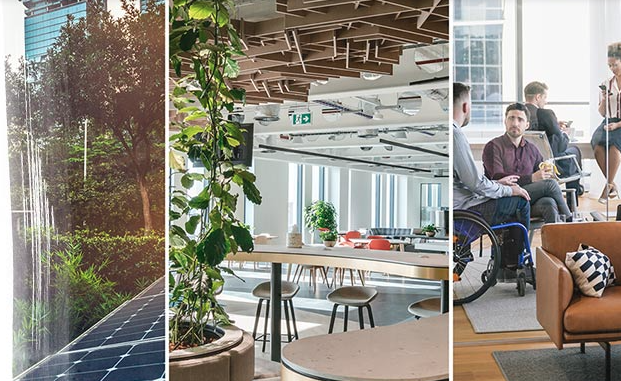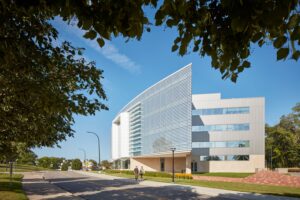
- Kim Kisner
- Business
- 03/19/2024
JLL’s Sustainability Services Business Targets Carbon Lifecycle, Resource Decisions, and Risk

JLL, incorporated as Jones Lang LaSalle, is a global real estate services company with over 100,000 employees and offices in 80 countries.
The company launched its sustainability services business in 2021 and it now has over 1,000 sustainability professionals working in this capacity globally.

Greg Bolino, JLL’s head of global sustainability strategy & assets, explained the company’s approach to SBN Detroit.
Q: What can you tell us about JLL’s sustainability services?
A: Our mission is to help clients achieve their sustainability goals, and we know this will help us achieve our goals and result in JLL being more sustainable as a business.
Our sustainability services are built on three pillars: Consulting, which involves advising clients on investment strategies and asset planning; Clean Energy – assisting those who invest in infrastructure to ensure their initiatives involve clean energy; and Sustainable Operations, which focuses on helping clients achieve their sustainability goals within their facilities.
Q: When was this established and what is the impetus behind it?
A: The company has been doing things related to sustainability for years. In 2021, I was brought in to transform the practice to formalize and scale these services.
Q: JLL has 30,000 people trained in sustainable real estate – how do you define sustainable real estate?
A: We focus on four things when it comes to sustainable real estate: carbon lifecycle; resource decisions such as waste and water consumption; social value; and risk, which includes physical climate impact, business risks, and economic risks.
We trained 30,000 employees to have a working knowledge within these areas, 2,500 of our employees are network champions and advocates, and 1,000 practitioners work in the Sustainability Services group full-time.
Q: How do you approach increasing the value of a client’s portfolio with sustainability at the forefront?
A: We work with real estate investors and corporations.
When it comes to investors, if we look at office leases in the U.S., 34% of leases will renew in the next two years. More and more companies are looking for space to help them reach their decarbonization goals. This puts pressure on owners of facilities to invest in decarbonization. So, we are helping investors think through the rationale for making these investments.
Many big corporations such as banks and tech companies that lease space are just starting to work out their carbon pathway. We help them bridge that chasm by rethinking their locations, relationships with landlords, and capital investment plans.
So, both investors and corporations have consequential decisions at hand when it comes to decarbonization and sustainability, and we help them work through these issues.
Q: The JLL website states that 40% of carbon emissions globally come from buildings, so decarbonizing real estate is fundamental to securing a more sustainable future. What can you tell us about this?
A: The 40% number is the most quoted figure in real estate. I think that understates the size of the challenge. Transportation and buildings combine to make up the majority of a large city’s carbon footprint. This is why so many cities are setting standards to compel buildings to do more.
Even companies whose real estate is a small part of their carbon footprint want to decarbonize their buildings now because it’s the first thing people see, and they want to be clear about their commitment. The greatest pressure is coming from employees on this front.
Q: What are some examples of work you do in Southeast Michigan?
A: JLL has offices all over Michigan including in Ann Arbor, Royal Oak, and Detroit, and we have our hands in so many things. I’ve advised Michigan utilities, the city of Ann Arbor, and local developments working on sustainable communities. I’m a founding board member of the Equitable Ann Arbor Real Estate Trust focused on more development of affordable housing. We work locally and globally.
Q: JLL has a net-zero target validated by the Science Based Target Initiatives collaboration between the CDP (Carbon Disclosure Project), the United Nations Global Compact, World Resources Institute, and the World Wide Fund for Nature. What does this mean? What actions are you taking internally to address sustainability?
A: JLL was among the first in our industry to commit to emissions-reduction targets based on criteria set by the Science Based Targets Initiative (SBTi). Our goal is to reach net-zero greenhouse gas (GHG) emissions across scopes 1, 2, and 3 by 2040. We have a near-term target to reduce emissions by 51% by 2030.
This is a massive goal. 96% of our carbon footprint consists of our client’s facilities. So, our internal commitments and goals flow through to our clients.
Q: What are the market forces you are up against?
A: The U.S. office sector is going through a difficult time. High-interest rates make improvements challenging. In the US, we are the slowest to return to work anywhere around the world. Weak occupancy in buildings has contributed to slowing retrofit investments. Buildings are the least digitized asset class, making analytics and modeling more challenging.
Q: What is the end game?
A: The end game is simple – sustainability must be baked into how Real Estate is bought, sold, and managed.
We are moving to a place where we must do business more sustainably. The whole value chain has to change.
It’s inescapable that the market and employees are watching these commitments. There is no way companies can ignore or withdraw from these goals. The economics behind moving to sustainability are getting stronger and stronger.
Be sure to subscribe to our newsletter for regular updates on sustainable business practices in and around Detroit.
Kim Kisner
- All
- Business
- Community
- Education
- Events

ZF Group, a global technology company with its North American headquarters in Northville, specializes in systems for passenger cars, commercial vehicles, and industrial technology. With a focus on next-generation mobility, the company develops solutions that address electrification, automation, and digitalization while aiming to improve safety, efficiency, and sustainability in transportation. SBN Detroit interviewed Anuj Shah, Sustainability Lead, for the Americas, to explore the most pressing environmental challenges in...

The Chip Bag Project, based in Detroit, is a sustainability initiative that upcycles hard-to-recycle snack packaging — particularly chip bags — into insulated sleeping bags for individuals experiencing homelessness. Founded by Eradajere Oleita, the project addresses both environmental waste and housing insecurity by transforming materials like Mylar into practical, thermally efficient solutions. In June, Oleita was among Trelllis’s 30 Under 30, its annual recognition of the brightest young...

PowerPanel, headquartered in Oxford, focuses on sustainable energy technology with a particular emphasis on hot water systems and thermal energy capture. The company designs and manufactures modular solar hybrid systems that integrate both photovoltaic and thermal components into a single unit. Its goal is to offer energy solutions that are more efficient, durable, and economically viable for a range of commercial and industrial applications. SBN Detroit interviewed Garth...







